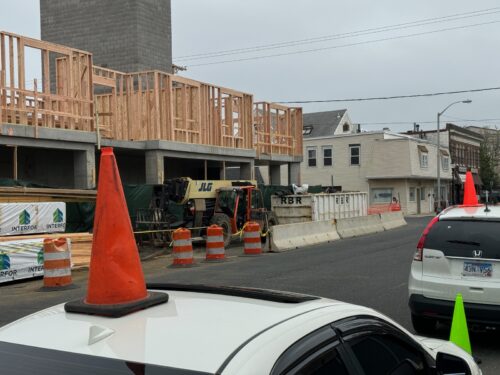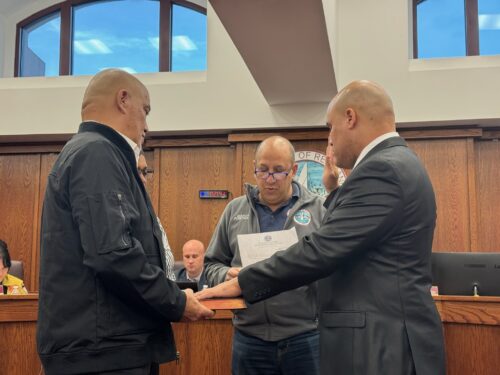
By DUSTIN RACIOPPI
Turns out you can break the ties that bind.
E-Street Band drummer Max Weinberg barely persuaded an apprehensive Middletown planning board Wednesday to lift a deed restriction it had imposed eight years ago to prevent him from further subdividing his 16.2-acre Navesink estate.
Using words like ‘hardship’ and ‘discrimination,’ Weinberg’s team of legal and planning experts argued that the deed restriction, which Weinberg agreed to at the time, had stuck him and his family with an unfair burden.

In 2003, with the planning board expected to increase the minimum lot size in the Navesink area to 10 acres, from five, Weinberg hastily sought to subdivide his then-37-acre estate into four unequal-sized lots, including one of 16 acres for his residence. The remaining three lots of about 6.5 acres each were to be sold for development.
The move drew sharp criticism from then-planning board member Judith Stanley Coleman, Monmouth County’s matriarch of land conservation, and other neighbors, who questioned Weinberg’s commitment to land preservation.
The board granted Weinberg’s request, but placed a deed restriction to prevent further division of the parcels.
The expected zoning law change, however, never came about, and Weinberg, who recently left his stool behind the drum kit of Conan O’Brien‘s Late Night and Tonight Show, now finds himself in a unique situation as a result, said his lawyer, Michael Steib.
Weinberg now wants to sell seven acres and maintain the rest for his residence.
“You have an applicant who has a 16-acre property in a five-acre zone, and is being discriminated against,” Steib said, noting that while owners of other properties smaller than 16 acres can subdivide, Weinberg cannot. “I think, under the circumstances, there has been change. Like I said before, Conan’s come and Conan’s gone. So do regulations. I think it’s time the burden be removed.”
Board Chairman John Deus didn’t buy the discrimination point, and like other board members, grappled with reversing a decision made by the body, expressing worry about setting a precedent for undoing agreements.
“What I’m having a hard time with,” Deus said, “is saying, ‘let’s have a do-over.'”
Recognizing that Weinberg was in fact put in a unique situation, board attorney James Gorman said Weinberg’s agreement to the restriction back in 2003 was a bit like playing blackjack at a casino.
“Sometimes you just can’t go back. That’s just the risks of the game,” he said. “I understand that it hit this owner particularly hard and in a particular way that it didn’t hit anybody else.”
He continued: “I agree they (Weinberg and his wife, Becky) kind of got stuck. I think there’s no question about that.”
Weinberg’s professionals argued the proposed additional subdivision would have no adverse impact on the McClees Road neighborhood, the environment or the township’s master plan.
The hearing followed testimony on a controversial proposal to build 342 homes in Lincroft, and by the time Weinberg’s hearing was ready, the chambers had cleared save for Weinberg’s team, a couple of neighbors who did not speak and a reporter.
Weinberg’s planner, Thomas A. Thomas, tried to put Weinberg’s appeal into perspective. He said what Weinberg proposes a large and expensive house is what municipalities wish for: ratables that pay for themselves.
When Deus asked, “why do we need another house there?” Thomas responded, referencing the Avaya plan, “why do you need another 325 houses?”
The point, Deus recognized, is that a 16-acre property is hard to sell these days. And that’s what Weinberg’s application boils down to, Deus said.
“Fact is, the economy doesn’t look well on 16 acres,” Deus said.
Still, Deus said he could not vote to reverse an agreement between the board and Weinberg.
“What precedent does this then set for any condition the board sets?” he said. “It’s a precedent for undoing agreements, and there’s an agreement here.”
“The board always has the inherent authority to say, nevermind, you’re right, we’re changing this,” said Gorman, just before the board took a vote.
Deus and two other board members voted against the separate deed request and application to subdivide the property. Both measures passed 4 to 3.
Weinberg’s request now goes to the governing township committee and, potentially, a state court judge for final determination.
Weinberg, 60, wearing khakis and a navy-blue sport jacket, said little at the meeting, except to thank the board for hearing the matter and to correct Deus on a point about the number of lots he was subdividing.
When approached by a reporter for comment afterward, Weinberg tapped Steib on the shoulder and walked down the hall.





















